Story and photos by Shabna Ullah
Best Village on the West Coast Demerara appeared quiet and peaceful during a midday visit, but one man commented that the peace gets disturbed in the afternoons.
He explained that most of the residents were away at work or school and upon their return there is a bustle of activity and sounds of loud music.
Some residents are engaged in rice and cash crop farming or operate grocery and liquor shops at their homes, while others are employed with the government or private businesses.
Best is located behind the village of New Road, Vreed-en-Hoop and in front of Crane Housing Scheme.
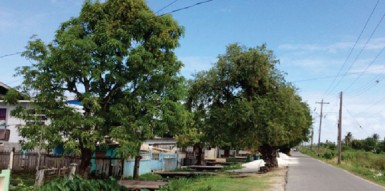
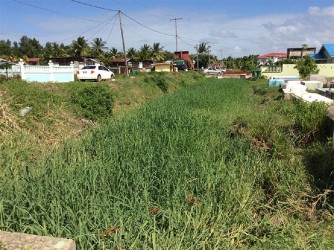
It is home to the West Demerara Regional Hospital (WDRH) and the Ezekiel Funeral Home. The cemetery is located nearby and it was observed that some sections were taken over by thick vegetation.
Residents are happy that a hospital is available nearby, but some said they are not pleased at all with the service which is very slow.
They said that most people who can afford it, prefer to go to private hospitals for treatment.
The main drainage canal in the village is overtaken with thick vegetation and residents said poor drainage was resulting in flooding whenever it rains.
They noted though that parts of the trench were cleaned “just before Christmas” and hoped that it could be maintained more often so that their lives can be more comfortable.
A predominantly Indo-Guyanese community with a population of over 200, the village also has a mandir and a church.
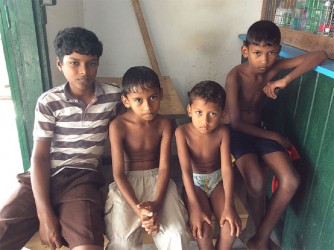
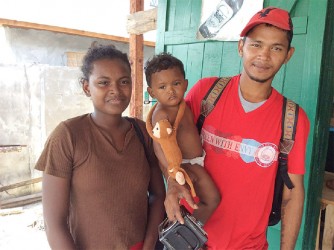
Jamnie Lachman, 84, who moved to Best from Uitvlugt after getting married, said there were just about two houses in the village at the time and the village was actually rice fields.
She was relaxing in her hammock while a daughter who had gone to visit her was helping her with household chores.
A 14-year-old granddaughter who stays with her had gone to school and her pet parrot that would keep her company was in a cage nearby.
She was still in distress after losing her 61-year-old son Narine in a freak accident two months ago. He had climbed up a trestle to fix a water tank when he slipped and fell into a neighbour’s yard. They picked him up in an unconscious state and rushed him to the WDRH. He was immediately referred to the Georgetown Public Hospital where he died the following day.
The pleasant woman who gave birth to 10 children said she worked hard in her days, tending to rice fields with her late husband, who also did cane harvesting. Together they were able to save enough to build a house.
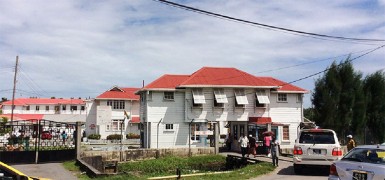
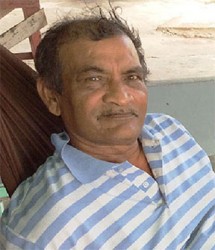
She said life long ago was easier than now, lamenting that “everything is so expensive. Now people can’t take care of 10 children so easily.”
An active woman, she never missed her weekly sessions at mandir, but she is unable to go now because of arthritis pain.
Justice
Bhojmatie Mahabeer, 81, who was born at La Jalousie had also moved to the village to join her husband and she too worked in rice fields. “In those days we had to reap with grass knife and plough the fields with bulls,” she recalled.
Like Jamnie, she was grieving the loss of a son, Balkissoon, 59, who died in a hit and run accident one year ago. He would have celebrated his birthday the same day of this newspaper’s visit.
She broke down in tears as she looked at his photo and as her daughter Pholmattie Ramkissoon, 48, explained what happened.
It was in Christmas 2013 when the mother and daughter invited Balkissoon and his family to spend the day with them.
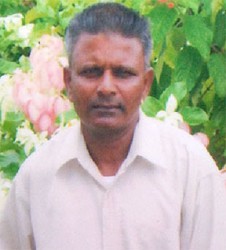
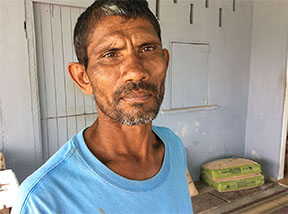
He helped them with little chores around the yard before enjoying a meal with the family. Later that afternoon he left to go for a walk and never returned. A minibus had hit him and pitched him among the grass close to their home and he was left there unconscious.
They searched all over for him and thought he was drunk somewhere. Early the following morning he regained consciousness and crawled out of the grass with his face swollen.
A woman who was passing could not recognize him at first but he gave her his wife’s number to call and he informed her of the accident. He was taken to the WDRH and was pronounced dead on arrival.
Residents informed the family that they had heard the impact but did not realize that the bus had hit Balkissoon.
The driver who lives nearby was charged and placed before the court but not for causing death by dangerous driving and it pains the family to see him still driving on the road.
All they wanted was for the driver to be brought to justice. Last Christmas they spent the day mourning Balkissoon’s death.
Pholmattie who operates a small grocery shop said crime was also affecting her business. She suffered a lot of losses after she was robbed twice in one year. She said bravely though that, “I’m still trying with no fear… I just close a bit early.”
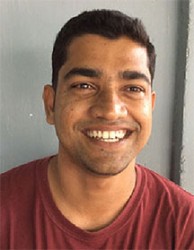
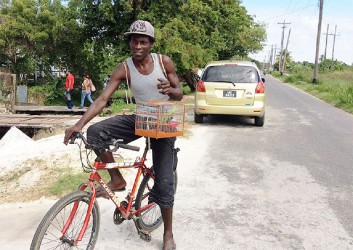
She recalled that during the first robbery the masked bandits broke into the home around 8 pm and held them at gunpoint and proceeded to rob them. Six months later six unmasked bandits came around 2 pm and beat the women and tied them up.
They then took away the key and ransacked the house and carried away cash and other valuables. She said her mother almost suffered a heart attack during the ordeal. Neighbours were scared to come out to render assistance.
Like other villages, there were a few abandoned houses; left behind by residents who had migrated to greener pastures.
Residents were pleased that they were enjoying electricity, water and telephone services as well as good road.
They no longer “punish” for water like in the past when they had to fetch it into their homes from standpipes along the road. But, they said, they were now paying for the service and they expected it to be good.
According to them, “the quality of the water is very poor and it has a bad smell. It looks as though trench water get into the line.”
They said too that the pressure is too low and they have to incur extra expenses to the Guyana Power & Light to pump the water.
Rice industry
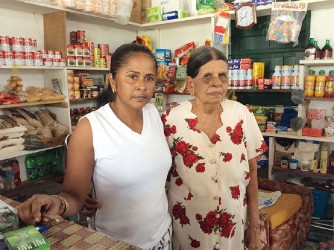
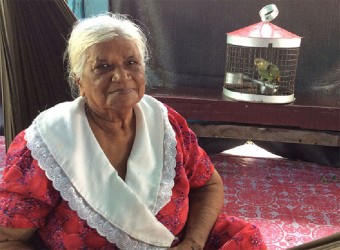
According to Ramjumar Manraj, a rice farmer, “From $12 that we used to pay before we are now paying $13,000 per year and we still have to buy water to drink…”
Manraj said the rice industry is declining with the reduction in the paddy price and increase in the cost of production. Last crop he earned only $2,600 per bag when that price was a lot higher for previous crops.
He was pleased that they have finally benefited from good road in the village after waiting for about 15 years. He said the potholes were huge and it was always a problem for vehicles to traverse the area.
His biggest nightmare would be if the road got to that condition again and said the water company has started to contribute to its deterioration. He pointed out that the workers would “dig holes to put down pipes but they don’t fill it back.”
Manraj lived 17 years of his life in Suriname and said “those were the best days.” He returned home to help take care of his sister, a former teacher, after she got sick.
His nephew, Ajay Jairam, 30, is a goldsmith by profession but has joined his uncle in rice farming as well. He is sad that both businesses have suffered “blows because of price.”
In the case of gold, the price has increased; “we have to pay a high price but when we make the jewellery and take them to the market they don’t sell.”
He had gone to Trinidad during last year and was impressed that “the gold business is brighter there.” He learnt the trade from working with other goldsmiths and decided to establish a workshop.
Jairam was also distressed at the way “some systems work in this country,” referring to his landline telephone being disconnected over six months over payments.
He said he went into the telephone company soon after and paid “but up to now they cannot reconnect the phone… I fed up calling them.”
Stray-catchers
A cattle farmer/milk vendor, Lakeram Singh, 39, had just finished tending to his stocks when this newspaper caught up with him.
Originally from Wakenaam, he described himself as a “rolling stone,” having moved from “place to place” in search of work as a labourer. He eventually settled in the village a few years ago.
Singh said he is happy that the government has set up a system to catch stray animals but said the stray-catchers are taking advantage of the situation.
He claimed that they had gone into the village, “loosing the animals that tie up and putting them in the van. Just because they get pay for each animal they impound they don’t care how they get them.”
He said the stray-catchers were only supposed to pick up animals that were roaming the roadways.
Residents, he said, got angry one day and beat the stray-catchers and chased them with cutlasses. He had even pelted a bottle after they started taking his cows and a police officer who was part of the team got scared and dropped his gun and ran.
At that stage, the other men in the van “pelt out a goat” they had wrongfully picked up. He said too that his sister was returning home one day with her goats after grazing them and they took them away.
Suraj Bissoon, 21, along with his reputed wife, Ariana, 18, and their baby, Andrew who carried a stuffed monkey around his neck, had gone over to the shop to make a purchase.
Andrew considers himself an “all-rounder” and said he works as a carpenter, salesman and a labourer in rice fields to survive.
Bird-lover
Nicholas George, 41, a father of nine and a fisherman on a on a trawler came home to spend the holidays with his family.
He was riding out his bird, a Twa Twa when this newspaper caught up with him. He loves birds and has nine in all so far. He plans to train them to enter the bird-whistling competition by next year.
He is confident that he will win and declared that “even if I don’t get first I know I will get some prize.”
He started an interest in birds from a young age and finds pleasure in investing in them and taking care of them.









